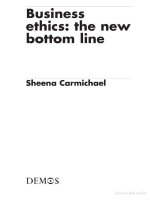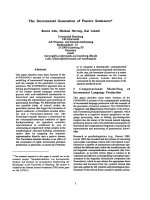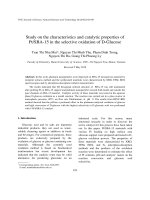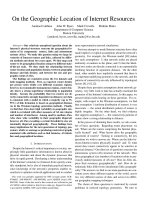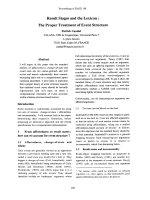BUSINESS ETHICS The Ethical Revolution of Minority Shareholders pot
Bạn đang xem bản rút gọn của tài liệu. Xem và tải ngay bản đầy đủ của tài liệu tại đây (1.7 MB, 278 trang )
BUSINESS ETHICS
The Ethical Revolution of Minority
Shareholders
This page intentionally left blank
BUSINESS ETHICS
The Ethical Revolution of
Minority Shareholders
JACQUES CORY
by
Springer
eBook ISBN: 0-387-23231-1
Print ISBN: 0-387-23040-8
Print ©2001 Springer Science + Business Media, Inc. (Hardcover)
All rights reserved
No part of this eBook may be reproduced or transmitted in any form or by any means, electronic,
mechanical, recording, or otherwise, without written consent from the Publisher
Created in the United States of America
Boston
©2005 Springer Science + Business Media, Inc.
Visit Springer's eBookstore at:
and the Springer Global Website Online at:
CONTENTS
ACKNOWLEDGEMENTS
1. INTRODUCTION
2. THE INEFFICIENT SAFEGUARDS OF THE
MINORITY SHAREHOLDERS
3. THE ATTITUDE OF SOCIETY
4. THE EXCESSIVE PRIVILEGES OF THE
MAJORITY SHAREHOLDERS
5. INTERNET AND TRANSPARENCY AS ETHICAL VEHICLES
6. ETHICAL FUNDS
7. ACTIVIST ASSOCIATIONS, ‘ TRANSPARENCY
INTERNATIONAL’, ‘ADAM’
8. CASE STUDY OF THE FRENCH COMPANY LOSKRON
9. CASE STUDY OF THE ISRAELI/AMERICAN COMPANY
FUROLIAS
10. CASE STUDY OF THE ISRAELI COMPANIES ERINSAR
AND SOKTOW
11. CASE STUDY OF THE AMERICAN COMPANY MASTOSS
12. CLASS ACTIONS
13. 36 LAWS OF WRONGDOING TO MINORITY
SHAREHOLDERS IN UNETHICAL COMPANIES
14. CONCLUSION
BIBLIOGRAPHY
INDEX
PAGE
vii
1
7
21
27
37
47
61
77
95
137
185
227
233
237
243
263
This page intentionally left blank
ACKNOWLEDGEMENTS
The subject of safeguarding the rights of minority shareholders has not
received much attention until now. After experiencing more and more cases
of wrongdoing throughout my business career, I have decided to explore
thoroughly the subject and devote several years to study the matter in a
theoretical and empirical research. My approach is mainly ethical, and I do
not hesitate to state vehemently my attitude towards the deterioration in
business ethics that is mixed with confidence in the new vehicles for the
safeguarding of minority shareholders, mainly the Internet, Transparency,
Activist Associations and Ethical Funds.
In view of the pertinence of the book’s subject, many friends and colleagues
have assisted me with their advice and support, and I would like to mention
especially Meir Tamari, James Weber, Samuel Holtzman, Jean-Philippe
Deschamps, Edvard Kimman, Andrew Pendleton, Anke Martini, Dove Izraeli,
Ishak Saporta, Francis Desforges, Nathalie Mourgues, Gad Proper, Rafi
Koriat, Daniel Weihs, Peretz Lavie, Rachel Zeiler, Naomi and Itshak Zoran,
Dalia Golan, Tali Aharoni, Dietmar Fuchs, Nira Cory and Pierre Kletz.
I would like to express my gratitude to Colette Neuville, President of ADAM,
who succeeds almost alone in conducting a crusade against French companies
that wrong the rights of minority shareholders. Her courage and perseverance
are admirable and her comments were very valuable to me.
I also want to thank my excellent editor Allard Winterink, who has made a
remarkable contribution to my book, had confidence in me, and assisted in his
warm and kind manner to make the project succeed. Special thanks also to
Carolyn O’Neil and Jill Garbi for their valuable assistance in editing the book.
Last but not least, my greatest thanks are to my wife Ruthy, and my children,
Joseph, Amir and Shirly, who encouraged me throughout the long years of
struggle and efforts in order to achieve the expected results, with many
personal sacrifices, but with an unequalled cohesion.
The frank and open approach and the conclusions and recommendations on
the touchy issues of this book may not be pleasing to some of the readers. I
hope that even more readers will react favorably and even with enthusiasm to
the subjects treated. My attitude is simple, I would like to shake the
indifference on the cases of wrongdoing to minority shareholders in order to
bring the subject to the forefront of the public’s interest. If this book will
contribute even slightly to this purpose, I will have attained my goal.
ABOUT THE AUTHOR
Jacques Cory is a businessman with a background in Economics and
Business Administration (MBA from Insead, France), who has
encountered many cases of despoiling minority shareholders in his long
international career in top-level positions in the Israeli high-tech industry
and in mergers and acquisitions.
Cory decided to write a thesis and a book on this subject in a frank and
open approach, in order to bring the subject to the forefront of the
public’s interest. He is a member of Transparency International Israel
and The Society for Business Ethics, and is very active in the Israeli
business ethics community.
Cory is the author of the ethical novel “Beware of Greeks’ Presents”, to
be published in the forthcoming months in Israel by Bimat Kedem
Publishers.
1
INTRODUCTION
“Morten: And what are we going to do, when you have made liberal-minded
and high-minded men of us?
Dr. Stockman: Then you shall drive all the wolves out of the country, my
boys!”
(Ibsen, An Enemy of the People, Act V)
The theoretical and empirical research of this book describes how the
traditional safeguards of the rights of minority shareholders have failed in
their duty and how those shareholders have remained practically without any
protection against the arbitrariness of the companies and majority
shareholders. The law, the SEC, society, boards of directors, independent
directors, auditors, analysts, underwriters and the press have remained in
many cases worthless panaceas. Nevertheless, in the Ethics of 2000 new
vehicles have been developed for the protection of minority shareholders,
mainly the Internet, transparency, activist associations and ethical funds.
Those vehicles give the shareholders at least the chance to understand the
pattern and methods that are utilized to wrong them and give them a viable
alternative for investment in ethical funds.
The new vehicles will prevent minority shareholders from using the
Armageddon weapon, by ceasing to invest in the stock exchange and causing
the collapse of the system, that discriminates against them. The preconditions
for the ethical revolution of minority shareholders do exist, but they are
insufficient as other conditions are needed to be met, such as the ostracizing
of unethical managers by society, appointment of ethical CEOs to head the
companies, and above all - giving an equal weight to financial and operational
performance (the hardware), as well as to ethics and integrity (the software).
The book is based on qualitative and inductive research. All the cases
presented in it are based on current events and try to find the common aspects
and basic rules that govern wrongdoing to minority shareholders. In the four
cases of US, French and Israeli companies, most of them in high-tech, the
minority shareholders lose almost all their investment. Those are not
exceptional cases but rather the norm in many companies, which is illustrated
by qualitative cases, without being able of course to quantify them. Case
studies are the preferred strategy when ‘how’ and ‘why’ questions are being
posed. The purpose of this book is therefore to analyze why and how
2
companies do not act ethically toward their minority shareholders, not how
many, not which, not to what degree and not where.
The evolution of business ethics in the last ten years of the twentieth century
has been accomplished in parallel to the political, social and economical
world developments. It is not a coincidence that in the decade where the Iron
Curtain has collapsed, most of the world conflicts have been resolved, and the
western world has accomplished unprecedented economic achievements,
business ethics has started to become an inevitable norm in most of the
developed world, especially in the United States.
The notions of quality, ecology and service have become predominant,
employee harassment has become illegal, companies contribute more and
more to the community, and ethics has ceased to be an oxymoron. Only in one
field has there been practically no progress – ethics in the relations between
companies and minority shareholders. The officers of the companies pledge
allegiance uniquely to the majority shareholders, or rather to the shareholders
who control the boards of directors of their companies, even if they hold only
the minority of the shares. Those shareholders will be referred to in this book
as majority shareholders.
The most advanced country in its protection toward minority shareholders is
probably the United States. Following the scandals of the ’80s, the SEC,
public opinion, the press and the academic world are rather sensitive to this
subject, although the other ethical norms are much more applied. France and
Israel have done very little to safeguard the rights of minority shareholders,
and it is high time that the public and academic world will put this topic in the
forefront of the business world’s attention.
The goal is not to promote altruism in business, although it is a valuable
cause. It is evident that if majority shareholders, together with the companies’
management, will continue to wrong the interests of minority shareholders,
the latter will cease to invest in the stock exchange and cause the inevitable
and irreversible collapse of the value of shares, the impossibility to raise funds
in the stock exchange, and finally – a much worse recession than in the ’30s.
Minority shareholders can almost never count on a legal defense as they have
a very slight chance against the companies, which are armed with powerful
legal defense and public relations teams as well as ‘unlimited’ time and
resources to devote to winning their cases. In most cases, minority
shareholders are individuals with limited resources who do not have the time,
funds and know-how to fight against large companies. The press sympathizes
in many cases with the companies, particularly those that hold shares in the
newspapers, provide advertising budgets or are closely tied with the press in
other businesses.
3
It is true that in many cases minority shareholders are large financial
institutions, funds that manage pensions and savings of employees,
investment funds and others; that have much more power than the individual
shareholders. In those cases, majority shareholders tend to compensate
partially the funds, but only in cases where the funds’ managers use their
strength, threaten or actually sue the companies. In many cases, the funds’
management does not learn at all that they have been wronged, as they
manage thousands of investments, or they do not want to devote the
management attention and the money to recuperate the sums that are only a
small fraction of their total investment. In other cases, the interests of the
funds differ from the interests of the small shareholders that invest their
savings in the funds, and they sacrifice those interests on behalf of other
interests that they have in their agenda.
One reason for the ‘clean’ conscience of the managers of the companies, that
despoil the rights of the minority shareholders is the lack of personification of
those shareholders, who are in most cases small shareholders who do not
know anybody in the companies, and who are usually interested in obtaining
prompt profits. They are perceived by the managers and majority shareholders
as speculators who cannot cause them any harm. It is much easier to commit a
wrongdoing toward somebody that you do not know and do not appreciate,
especially if you are convinced that you are right. However, the managers
have a personal interest in their companies, and they perceive their missions
beyond the immediate profits, pledging allegiance to the majority
shareholders that have often founded the companies, possess the control and
can remunerate and fire them.
Small minority shareholders do not know in many cases that they have been
wronged, as they do not have links between them, and the schemes are
performed in the shade, far from the public eye. Transparency is therefore
necessary in order to dissipate the fog that the wrongdoers want to prevail.
The press often sympathizes with the large companies and rarely agrees to
divulge scandalous cases. Other businessmen who might have lost large sums
as minority shareholders do not complain against their colleagues due to the
law of Omerta, which states that you do not file complaints against a
colleague. Most businessmen prefer not to open Pandora’s boxes often
containing similar cases of their doing. In extreme cases, you can always buy
the silence of your colleagues or compensate them in an indirect way.
The minority shareholder can always complain to the Securities Exchange
Commission (SEC) in the US, the Commission des Operations de Bourse
(COB) in France, the Israeli Securities Commission, or similar organizations,
that will be referred hereinafter in this book as ‘SEC’. But these organizations
are governmental, with limited budgets, and have an agenda that does not
4
always include safeguarding the interests of minority shareholders. Those are
not as politically influential as the large companies that contribute funds to the
political parties who govern the countries and who name the heads of the
SEC. Even worse, the heads of the government organizations receive top-
level positions in the companies they controlled, after they leave their
organizations. The least that could be done is that those officials will not be
allowed to work in business organizations and will get a lifetime pension, like
judges, in order to ensure their objectivity.
How is it possible to implement this change of attitude? One has to start
probably at the top of the companies, the CEOs, as it is they who ultimately
determine the ethical climate of their companies. Unfortunately, the
companies are the last vestige of the dictatorial regimes. Most of the world,
especially after the collapse of the USSR, is ruled by democracies. All
western countries have laws on equal rights regardless of gender, race and
religion. Only one domain of human activity remains dictatorial – the
companies, where the CEOs and the majority shareholders have absolute
power and rule the companies.
The greatest danger for minority shareholders consists in the holy alliance
between the executives of the companies and the majority shareholders, who
appoint and remunerate them. Those executives involve themselves in the
quarry, by receiving shares and warrants of the companies in very
advantageous terms that enable them to get rich with almost no risks.
One of the most serious problems is that the shareholders who control the
companies almost always have insider information. In some countries it is
legal to benefit from such information in the buying and selling of shares in
the stock exchange, and in others it is very difficult to prevent the use of such
information due to the collaboration of the CEOs. In the bullish periods,
majority shareholders often succeed in selling a sufficient amount of shares in
the stock exchange or at public offerings, with very high price to earnings
ratios, recouping their initial investment.
From this moment on they no longer risk their money, and even if the
company gets into trouble, the only shareholders who lose their investment
are minority shareholders who were the last to purchase the shares at the high
prices. Therefore, majority shareholders tend to speculate very often, much
more than if they would have risked their own money; as they know in
advance, much ahead of the public and minority shareholders, when it is
worthwhile to sell their shares - if the condition of the company will
deteriorate, and when it is preferable to buy shares - if the financial conditions
of the company are expected to improve.
5
The executives and majority shareholders who commit unethical and unlawful
acts are not ostracized by society. On the contrary, very often, they are
admired and envied by their colleagues who would have behaved similarly if
they only had the opportunity. They are treated as ‘smart guys’ who take
advantage of the good opportunities that they encounter. Man is before
everything a social animal and it is imperative that businessmen who are
unethical will be treated as outcasts, banned by society and despised by their
fellows.
In recent years a revolution has occurred in the publication of data on the
Internet. Most of the quoted companies have a site on the Internet and stock
talk groups comprised mainly of minority shareholders, where information
and misinformation is shared between the shareholders who have access to the
Internet. It is pure democracy, as in the agora of Athens, where all citizens
had the right to participate. Information about future wrongdoing to minority
shareholders can be divulged in advance and one has only to read it and sell
his shares, while there is still time.
The full transparency of companies, via the Internet and ethical reports, could
safeguard ethics, even if it is achieved through the assistance of whistle-
blowers. Transparency compels every employee to adopt an ethical conduct,
as his conduct could be published on the Internet and the press or scrutinized
by activist associations, so that his family, friends and congregation would
learn of his conduct.
The implementation of ethics is assisted by the ethical funds. These funds
were established primarily in the United States, but are also very influential in
Canada, the Netherlands and Great Britain in the last ten years. They
comprise investments of more than two trillion US$ in the United States and
have succeeded in obtaining financial results above the average of the US
stock exchange, while keeping very strict ethical screening. The minority
shareholders will have to collaborate with those funds and buy only shares of
ethical companies.
Ethical investing is screened to reflect ethical, environmental, social, political,
or moral values. It examines the social records of companies in local
community affairs, labor, minority and gender relations, military and nuclear
production, product quality, approach to customers, suppliers and
shareholders, and avoidance of sales of tobacco, alcohol, pornography or
gambling products.
In the last decade of the century we witnessed in the US and in France,
but not in Israel, an effervescence in social and other activism of shareholders,
and in many cases they have succeeded in changing the initiatives of very
large companies, especially in the United States. One of the main activist
6
associations that has launched a mission to fight corruption is Transparency
International, which published in 1999 a survey on the level of world
corruption, ranking the United States in place, Israel in and France in
Less corrupted countries are Denmark in place, Canada - the
Netherlands- UK- and Germany- place.
An example of an activist association uniquely dedicated to safeguarding
minority shareholders is l’Association pour la Defense des Actionnaires
Minoritaires (ADAM), which was founded in 1991 in France by its president
Colette Neuville. It has conducted very important campaigns to safeguard and
prevent wrongdoing to the interests of French minority shareholders, as
described in one of the cases of this book. The ethical struggle of minority
shareholders conducted by activist associations has to be fought vigorously
but ethically, among others because the majority shareholders will always be
the strongest while using unethical methods, and the minority shareholders
will lose the legitimacy of their campaign.
But it is not enough that the campaign of minority shareholders will be fought
vigorously, ethically and courageously. It has to be fought also cleverly and
even cunningly. Ulysses did not succeed to win the Trojans until he
introduced the Trojan Horse. In our case, the Trojan Horses in the long
Odyssey of the minority shareholders are mainly the Internet and
Transparency. Those vehicles seem very innocent but have a tremendous
power that will benefit the weaker side of this campaign.
The majority shareholders, the boards of directors, and the executives of the
unethical companies who work for them tend to prefer an obscure and opaque
environment for their activities. Even when they have to disclose their
intentions in prospectuses, press releases or financial statements they do it in
many cases in such a way that average readers are confused with the facts, do
not perceive the double meaning of their terminology, and cannot read and
understand all the material that is handed to them. This book will show how
Transparency and Internet give the minority shareholders and stakeholders the
opportunity to reach the truth, in the most efficient, clear and precise way.
The book concludes that if the new vehicles will be preponderant, and the
other conditions will be met, then - led by activist associations - minority
shareholders will be properly organized, motivated and conscious of their
strength, thereby enabling them to win their fight and safeguard their interests
while behaving ethically. After all, the majority shareholders will never give
up their privileges willingly. The victory of this revolution will be the victory
of all of us, as everybody nowadays is considered to be a minority shareholder
and a stakeholder of a company, whether directly or indirectly through our
pension funds, or as a client, supplier, subcontractor, employee, member of a
community and citizen of a country in which the companies operate.
2
THE INEFFICIENT SAFEGUARDS OF THE
MINORITY SHAREHOLDERS
“Selon que vous serez puissant ou miserable,
Les jugements de Cour vous rendront blanc ou noir.”
According to your mighty or miserable position,
The judgment of court will render you white or black.
(La Fontaine, Fables, Livre septieme, Fable I)
There has been no major improvement, unfortunately, since the times of La
Fontaine’s fables until today. While presuming that the judges are
incorruptible, we have to admit that individual, weak, minority shareholders,
who do not have the time, means, and the assistance of the best lawyers, do
not have much opportunity to win a case against the tycoons of finance. In
paraphrasing the title of the film ‘The Untouchables’, which tells the story of
how Al Capone was sent to jail by untouchable government agents, who could
not be corrupted, we notice how the norms have evolved nowadays and how
the large companies are now untouchables, as the minority shareholders
cannot touch them or undermine their power if they have to confront them in
court.
The purpose of this book is to render the unethical businessmen
‘untouchables’ in the religious sense of the word, like the caste in India, so
that nobody would approach them, associate with them, or pay any attention
to them. This attitude would be in contradiction to the present veneration that
they enjoy from many of their colleagues. The unethical businessmen will be
ostracized and apprehended by their Achilles’ heel, which is the importance
that they give to their image in society. Their donations will be refused by
universities. They will receive no more honorary doctorates or legion of
honor. Impossible to imprison them due to their power, they should be treated
socially as Mafia outcasts.
All that is legal is not necessarily ethical, and all that is unethical is not
necessarily illegal. It could be legal to pour toxic materials into a river, but
this is certainly unethical and harmful. Laws can change, but ethics is much
more immutable. “Even more, laws themselves must be governed by moral
criteria, which gives rise to the classic distinction between just and unjust
laws. Thus, a law that violates a person’s dignity (sanctioning slavery, for
example) is not just and therefore cannot be accepted and observed a just
8
law must be observed, not for merely practical reasons (to avoid
punishment, for example) but also for moral reasons: there is an ethical
obligation to observe it.” (Harvey, Business Ethics, A European Approach,
Argandona, Business, law and regulation: ethical issues, p. 128-129) We
should educate people to behave ethically exactly as we educate them to obey
the laws. Aristotle has said that in order to know how to conduct we have to
observe a just person. This maxim is somehow difficult to observe in the
modern business world, but we can nevertheless compare ourselves to
businessmen, who are relatively ethical.
“Ethics is above law and is also the source of the power of the law to oblige
morally. Laws are not something sacred, as Latin culture sometimes pretends:
they are no more (and no less) than an instrument at the service of the
common good of society. They are not an obstacle that must be knocked
down, jumped over or bypassed. They should be respected as a condition for
the proper functioning of society, and even as a condition for personal
freedom. (This notwithstanding, it must be recognized that in practice many
laws may be defective or even immoral, and therefore not compelling.)”
(Harvey, Business Ethics, A European Approach, Argandona, Business, law
and regulation: ethical issues, p.130) This is the reason why in the polemic
between legality and ethics in business, the ethical considerations should be
predominant, because ethics is above the law, it is almost universal and
immutable, while laws are conjunctural, national and often unjust.
One of the most acute dilemmas of managers is the dilemma between cases,
which a priori seem equally ethical, but from different angles. Not the
dilemmas between just and unjust situations, as in this case the choice is
obvious, although it is not so simple for many businessmen. But the dilemma
between two just positions is much more intricate, as it is incrusted in our
basic values. “Four such dilemmas are so common to our experience that they
stand as models, patterns, or paradigms. They are: Truth versus loyalty,
Individual versus community. Short-term versus long-term. Justice versus
mercy.” (Kidder, How Good People Make Tough Choices, p.18) Kidder and
many other authors on ethics prefer ultimately truth to loyalty, as it is better to
divulge cases that are not ethical than to remain loyal toward a management
that is not ethical.
The author gives examples of loyalty toward Hitler, Mao, Stalin, Sadam
Hussein, or even Richard Nixon, which caused great damages to humanity,
but we should also mention the fate of those who preferred truth over loyalty
and who ended up in suffering atrociously. Between the individual and
community he prefers community, although he mentions that if he was a
Soviet citizen he would perhaps prefer the individual. Between short-term and
long-term he prefers long-term, as we see how the financial scandals of the
’80s, which were based on immediate gains in the short-term, were
9
detrimental to society. And if he would have to choose between justice and
mercy, Kidder would have opted for mercy, which signifies for him
compassion and love. As he can imagine a world so full of love that there
would be no need for justice, but he cannot imagine a world so full of justice
that we would not need any more love.
One of the most well-known cases that illustrates those conflicts is the
controversial case of Shylock, the Jew of Venice, who insisted on preferring
justice over mercy, by getting the pound of flesh that he asked for as a
collateral. This is the case of an individual who feels persecuted by the
community and wants to avenge himself. This is the case of a person who
knows that if he is satisfied in the short term he is going to lose in the long
term. This is the case of the businessman who has his own truth, which is
opposed to the loyalty that he owes to the Duke of Venice. And Shylock
exposes his point of view in the well-known dialogue with Salarino:
“I am a Jew. Hath not a Jew eyes? hath not a Jew hands, organs, dimensions,
senses, affections, passions? fed with the same food, hurt with the same
weapons, subject to the same diseases, healed by the same means, warmed
and cooled by the same winter and summer, as a Christian is? If you prick us,
do we not bleed? if you tickle us do we not laugh? if you poison us, do we not
die? and if you wrong us, shall we not revenge?”
(Shakespeare, The Merchant of Venice, Act III, Scene I, p. 203-4)
Shakespeare unties the drama in a manner that favors ethics as being stronger
than law, morals being stronger than a given promise. But Shakespeare‘s
ethics is quite equivocal, as it is applied against a Jew, who is treated by the
Duke as a stranger. Would the same ethics be implemented if the situation
was opposite, and Shylock was a poor Jew who owed money to Antonio, the
Merchant of Venice, a Christian originating from an ancient Venetian family?
Would we ask Antonio to conduct himself ethically toward a poor Jew in
order to prove Christian mercy toward him? The issue of double standards is
emphasized here in the most acerbic manner, because in order to conduct
ourselves ethically we should apply our ethics first of all toward the weak, the
poor, the strangers, and in the cases of this book toward the minority
shareholders, who do not have in most cases the possibility to confront the
mighty majority shareholders in court.
True ethics is revealed only when you do not have a sympathizing Duke of
Venice and a collaborating population on your side Clemency toward the
mighty at the expense of the weak is the height of hypocrisy, and
unfortunately this is what is practiced in many cases where the mighty and
rich are brought to justice. If a poor thief steals a few hundred dollars he is
sentenced to jail for many years, but if an Israeli financial tycoon is found
guilty of manipulating the price of the shares of his bank, causing the Israeli
10
minority shareholders and the state of Israel billions of dollars in losses, he is
not even sent to jail.
However, we should inlay in golden characters the speech of Portia, who
appears at the court disguised as a jurist doctor, and hang it on the walls of all
the board rooms in modern companies to be applied for stakeholders and
minority shareholders.
“But mercy is above this sceptred sway,
It is enthroned in the hearts of kings,
It is an attribute to God himself,
And earthly power doth then show likest God’s
When mercy seasons justice. Therefore, Jew,
Though justice be thy plea, consider this,
That in the course of justice none of us
Should see salvation: we do pray for mercy,
And that same prayer doth teach us all to render
The deeds of mercy.”
(Shakespeare, The Merchant of Venice, Act IV, Scene I, p. 211)
The ancient maxim, which says ‘if it ain’t illegal, it must be ethical’, is
completely erroneous, as the difference between ethics and law is as the
difference between the enforceable and the unenforceable. “Law is a kind of
condensation of ethics into codification: It reflects areas of moral agreement
so broad that the society comes together and says, ‘This ethical behavior shall
be mandated.’ But Moulton’s distinctions also make something else clear:
When ethics collapse, the law rushes in to fill the void. Why? Because
regulation is essential to sustain any kind of human experience involving two
or more people. The choice is not, ‘Will society be regulated or unregulated?’
The choice is only between unenforceable self-regulation and enforceable
legal regulation Surely a powerful indicator of ethical decay is the glut of
new laws – and new lawyers – spilling onto the market each year.” (Kidder,
How Good People Make Tough Choices, p.68-69)
History is full of examples of how kingdoms, which were lacking ethics, have
collapsed, and how regimes that were governed by so-called very humane
laws and an exemplary constitution which were not implemented, as in the
case of the Soviet Union, have also collapsed. The economic anarchy which
prevailed in Italy in the ’80s is another example of how the lack of obedience
to the law, or even more to ethics, could be harmful to the economic progress.
Should we obey immoral laws? The Nuremberg tribunal has categorically
decided – no! But where is the limit between disobedience and anarchy? The
English, who judged at those trials, were confronting at the same time the
disobedience to the laws of the British Empire from the same Jews who were
the victims of the Nazis and wanted to emigrate to Israel. The British arrested
11
thousands of illegal immigrants who returned to their homeland after having
survived the Holocaust, and sent them back to Europe or imprisoned them in
concentration camps in Cyprus until 1948. The Americans had racist laws
enforced until the ’70s and only the Civil Rights Movement, headed by
Martin Luther King, succeeded in shaking the American conscience and
changing the laws and the implementation of the laws.
The companies are ready to invest considerable amounts in trials, which are
much larger than the damages they would have to pay to the minority
shareholders or the government institutions. GE preferred to pay $30 million
in direct and indirect costs during a trial in which the government sued them
for the amount of $10 million in damages for price fixing. Ultimately, the
company was acquitted, and those who most benefited from the trial were the
lawyers, while the shareholders, the government and other stakeholders lost.
And this is the case of a trial against the American government. How can we
ask from a poor individual shareholder to finance such astronomical sums,
while the company will opt almost always to prefer the trial where it feels
strong in comparison to the shareholders? We will analyze later on in the
empirical part the class-actions and see how, effectively, it is almost
impossible for a shareholder to win a case against the mighty companies.
According to Monks, the decision of companies to obey or disobey the law is
simply a profit and loss decision. The company checks if the cost of
infringement of the law actualized by the probability to be discovered,
brought to justice, and punished (there is almost no risk to be imprisoned), is
equal to the cost of obedience to the law. If the cost is inferior, the company
will prefer to infringe the law. This is why it is imperative that at the head of
each company should stand an ethical CEO, with impeccable integrity and
ethics, who will not just calculate impersonal feasibility studies on the
benefits of obeying the law. We could try to make audits on the adherence to
laws, augment the damages paid by companies, and so on, but the companies,
with their infinite funds, their masses of lawyers and experts, and their
immeasurable patience will win almost inevitably in court against the
government, the stakeholders and the minority shareholders. They feel
themselves stronger than all those organizations and individuals, and the only
way to beat them is to change their attitude de profundis.
The Jewish religion teaches us that a just person builds a fence around the
law, as the ethical man has to observe the ethical norms, which are much
wider than the law. On the other hand, the modern lawyers seek loopholes in
the law and try to reduce the implementation of the law to a minimum, which
is in complete contradiction to Jewish law. It is therefore, practically
impossible to rely only on the law, which many influential companies and
lawyers try to reduce to a minimum, and we have to adhere to the ethical rules
which are much wider than the law.
12
An extremely important aspect, which prevents the minority shareholders in
most of the cases to resort to the law, is the time elapsing between the
wrongdoing and the decision of the court. Besides the resources that the
shareholder lacks, the risk that he incurs, and the loss of health, this
excessively long time makes a trial almost prohibitive. In 1990 Kuwait was
invaded by Iraq. The country was looted, thousands of citizens were murdered
or mistreated, many others fled the country. A country that was once one of
the richest in the world was completely ruined. The United States, which
decided to intervene, did so only six months after the invasion, while it was
practically too late. We say that time is of the essence, and time is an essential
factor in international relations as it is also with the rights of minority
shareholders. Even if the law can assist ultimately the minority shareholders,
if it occurs many years after they lost their money, it is too late to remedy
effectively the wrongdoing.
Of all the maxims that differentiate law from ethics, the most salient is
probably caveat emptor, which means that the buyer should always beware.
Everything is therefore permitted to the seller if it is legal, and it is the buyer
of the product or of the stock who should beware not to be wronged. The
author of this book maintains that if it is impossible to rely upon the ethics of
the seller, it is preferable to abstain from buying the product or the stock, even
if it is a bargain, as it is preferable to pay a higher price to an ethical seller
than a lower price to an unethical one. The reason is that if you have to
beware of the quality, the delivery, the service and so on, the effective price of
the unethical seller is much higher than the effective price of the ethical seller.
Nevertheless, there is some evolution in this respect, and the tendency today
in many cases is to make the seller beware and advise the buyer of potential
defects of the products. This occurs mainly if there is a law requiring it like in
the pharmaceutical industry or in the case of McPherson v. Buick in 1916. But
do we need to disclose everything to the public? “We need to ask, ‘Why in the
case of physicians and therapists, as well as for other professionals such as
attorneys, clergy, and journalists, is confidentiality so well protected in the
law?’ The duty to warn is limited in these relationships precisely because it
is important to protect privacy and fairness, on the one hand, and encourage
people to utilize professional help, on the other hand. Thus society forgoes
certain benefits that might be derived from disclosure in order to protect other
interests.” (May, Business Ethics and the Law, p. 19-20)
Ethical thinking and character bring about the ethical conduct, which is
different from legal conduct, as the law defines what is permitted and
prohibited, while ethics defines what should be done. If the law in the
century will be driven by ethics as maintained by certain specialists, it is
needed to make a thorough reform in the legal system, in France in particular,
13
as it permits in many cases, especially in the commerce courts – tribunal de
commerce, to transgress the rights of the minority shareholders as will be
examined in the case of the French company.
The campaigns against arbitrary decisions of the commerce courts conducted
by such important persons such as Mme. Neuville, President of ADAM, the
association for the protection of the minority shareholders, will undoubtedly
have a positive result. This reform will probably not assist the minority
shareholders of the French company, which were wronged in one of the cases
of this book by their company and were fined with hundreds of thousands
francs by the commerce court, but it will assist the minority shareholders of
the year 2000 and beyond. Until then, the shareholders could still resort to the
appeal court, Cour d’appel and then the supreme court, Cour de cassation, a
procedure which is nevertheless very long and costly.
Monks describes in his outstanding book ‘The Emperor’s Nightingale’ the
seven panaceas that are supposed to safeguard the corporate accountability.
Those panaceas are really not effective cures, although they give a false sense
of comfort that is more dangerous than the total lack of cure. The first panacea
is the CEO philosopher-king, who is supposed to distribute evenly the goods
of the company amongst the stakeholders. Unfortunately, the CEOs today
exercise near-monarchic power, and they are free to advance their own
personal interests in compensation, even to the point of harming the interests
of shareholders. “Institutional Shareholder Services (ISS) found that, in 1992,
the top 15 individuals in each company received 97 percent of the stock
options issued to all employees. Business Week wrote for all to read that ‘the
200 largest corporations set aside nearly 10 percent of their stock for top
executives’, adding that ‘in almost all cases, moreover, it’s the superstar CEO
who takes the lion’s share of these stock rewards.” (Monks, The Emperor’s
Nightingale, p.62) The second panacea says that if a state and/or federal
charter sets proper limits, then the corporation can serve the common good.
This chart is effectively very weak and is practically non-existing in
multinationals.
The third panacea is the independent directors. Those directors are nominated
by independent committees and are elected by the shareholders, but in most
cases they are effectively appointed by the CEOs of the companies. “Yet true
independence – as well as true nominations and elections – remains elusive.
How can an individual selected for a well-paying and prestigious job,
notwithstanding his or her compliance with the most exhaustive legal criteria
of ‘independence’, be expected to stand in judgment of those who accorded
him this favor in the interest of an amorphous group of owners? Only men
and women of the highest character can do this, but the best solutions cannot
depend on character alone Directors are not ‘nominated’, they are selected
by the incumbent directors (however independent) and the chief executive
14
officer. Shareholders do not ‘vote’, whether or not they mark a slate card;
only those named on the company proxy will be elected. Ultimately,
independence is a matter of personal character the search of such a director
requires that we be modern-day Diogenes, lamp in hand. This is not
acceptable. We cannot have a system that depends on the luck of stumbling
across an occasional honest man.” (Monks, The Emperor’s Nightingale, p.53-
4)
The fourth panacea is the board of directors, well-structured boards, that rank
high as a favored solution to governance problems. Monk believes that even
corporations with perfectly independent directors and perfectly structured
boards can remain insensitive to the needs of the public. The fifth panacea is
independent experts. “The experience with ‘experts’, however is
disheartening. The tendency to generate opinions satisfactory to present and
prospective customers is strong. ‘Fairness’ opinions – whether of the
prospective value of Time Warner stock, or in the leveraged buyouts that were
the source of the Kluge, Heyman, and many other fortunes – have turned out
to be wrong, not by percentages but by orders of magnitude.” (Monks, The
Emperor’s Nightingale, p.55)
The sixth panacea is the free press. The most acute problem of this panacea is
the large percentage of the press’ revenues that derive from advertising, which
may impair the impartiality of the press in regard to companies that finance
huge advertising budgets. Furthermore, Westinghouse has recently acquired
CBS, Disney owns ABC, GE owns NBC, Time Warner owns Fortune and
McGraw-Hill owns Business Week. The situation is similar in France and
Israel. It is true that there is no protocol of the sages of the media, but it is
difficult to expect critics on an unethical company from a newspaper which is
owned by a public company and which can be subjected to retaliation in the
future with juicy stories on the owners of the newspaper, written by another
newspaper which is owned by a competitor company.
The seventh panacea is multiple external constraints, such as the economic
constraints of competition and law, the impact of the tax and regulatory
schemes, and the constraining influence of social values on corporate decision
making. Adam Smith has recommended to rely on the invisible hand that will
arrange everything. It is the same blessed hand that brought the worst
recession ever in 1929, all the economic crises, stock exchange scandals,
inefficiencies in the legal and governmental system, the reliance on the SEC
that will solve everything and so on. All those ‘cures’ are only panaceas,
which cannot cure the wrongdoing to minority shareholders. The empirical
research of this book will prove in the case studies how all these panaceas
without exception proved to be inadequate at the moment of truth. Only new
organisms can cure the illnesses of the existing system, as all the other cures
15
have proved to be in most cases worthless panaceas for safeguarding the
interests of minority shareholders.
Zola describes in a magnificent way the panacea of the board of directors in
his famous book ‘L’Argent’, The Money. One would think that Zola had
participated in hundreds of board meetings in recent days in the US, Israel or
France. Only a genius writer like Zola can remain immortal and stay modern,
even after more than 100 years. “Saccard avait acheve de mettre la main sur
tous les membres du conseil, en les achetant simplement, pour la plupart.
Grace a lui, le marquis de Bohain, compromis dans une histoire de pot-de-vin
frisant l’escroquerie, pris la main au fond du sac, avait pu etouffer le scandale,
en desinteressant la compagnie volee; et il etait devenu ainsi son humble
creature, sans cesser de porter haut la tete, fleur de noblesse, le plus bel
ornement du conseil. Huret, de meme, depuis que Rougon l’avait chasse,
apres le vol de la depeche annoncant la cession de la Venetie, s’etait donne
tout entier a la fortune de l’Universelle, la representant au Corps legislatif,
pechant pour elle dans les eaux fangeuses de la politique, gardant la plus
grosse part de ses effrontes maquignonnages, qui pouvaient, un beau matin, le
jeter a Mazas.
Et le vicomte de Robin-Chagot, le vice-president, touchait cent mille francs de
prime secrete pour donner sans examen les signatures, pendant les longues
absences d’Hamelin; et le banquier Kolb se faisait egalement payer sa
complaisance passive, en utilisant a l’etranger la puissance de la maison, qu’il
allait jusqu’a compromettre, dans ses arbitrages; et Sedille lui-meme, le
marchand de soie, ebranle a la suite d’une liquidation terrible, s’etait fait
preter une grosse somme, qu’il n’avait pu rendre. Seul, Daigremont gardait
son independence absolue vis-a-vis de Saccard; ce qui inquietait ce dernier,
parfois, bien que l’aimable homme restat charmant, l’invitant a ses fetes,
signant tout lui aussi sans observation, avec sa bonne grace de Parisien
sceptique qui trouve que tout va bien, tant qu’il gagne.” (Zola, L’Argent, p.
310-1)
“Saccard had succeeded in getting hold of all the members of the board of
directors, in buying them out literally, in most of the cases. It is due to him,
that the marquis de Bohain, compromised in a story of bribing equivalent to a
swindle, discovered with his hand in the bag, could escape from a scandal, by
compensating the robbed company; and he became subsequently his humble
servant, while remaining with his head high, an aristocrat, the best ornament
of the board. Huret, as well, since Rougon has dismissed him, after the theft
of the wire that announced the transfer of Venetia, has committed himself
fully to the success of the Universelle, representing it at the Parliament,
fishing for it in the dirty waters of politics, keeping the largest part of the
shameless scams, that could throw him one day to prison.
16
And the vicomte de Robin-Chagot, the vice-president, received a hundred
thousand francs as a secret fee for signing without examination during the
long absences of Hamelin; and the banker Kolb was paid also for his passive
readiness to oblige, while utilizing abroad the strength of the company, which
put it even in jeopardy in his arbitrations; and Sedille himself, the silk
merchant, undermined by the consequences of a terrible liquidation, was lent
a huge sum, that he was unable to reimburse. Only, Daigremont kept his full
independence toward Saccard; which bothered the latter, sometimes, although
the nice person remained charming, inviting him to his feasts, signing
everything without inquiring, with his amiability of a skeptical Parisian that
finds that all is well, as long as he is gaining money.”
Minority shareholders themselves have today a distribution that varies
significantly from the past. The institutional shareholders have, according to
Monks, 47.4 percent of the capital of the American corporations, $4.35 trillion
in 1996, 57 percent of the capital of the 1,000 largest companies, and half of
this capital or 30 percent of the whole capital is held by public funds or
pension funds. “In mutual funds (more formally known as investment
companies), the ‘independent directors’ are chosen under the provisions of the
federal Investment Company Act of 1940. They are paid extremely well for
services that basically consist of deciding whether to ratify the investment
management contract (with a firm whose principals invited them to serve as
directors), and they almost invariably vote to do so. In other words, mutual
fund trustees are paid so much too much for doing so little that they are
unlikely to disturb their sponsors.” (Monks, The Emperor’s Nightingale,
p.148) The fiduciaries of the funds must not be nominated and paid by the
companies that they are supposed to control. We shall see in the cases
analysis how those fiduciaries behave in cases of abusing the rights of the
minority shareholders and what is the level of their courage and integrity.
A basic factor in the need of the preponderance of ethics over the law is the
ignorance of many shareholders of basic terms in the prospectus of
companies, which are for them like Chinese. The law and the SEC regulations
maintain that if all the important issues are disclosed in the prospectus - the
companies have performed legally, even if the most important issues are
disclosed in such a way that it is almost impossible to notice or understand
them, as we shall see in the empirical part of the book.
Furthermore, even according to GAAP’s rules, a company can attribute
‘extraordinary’ costs, due to a restructuring or purchase of a company, whose
main assets are intangible, as costs which are treated separately in the
financial statements, and which analysts do not take usually into consideration
in the valuation of the company. This gives the possibility to companies and
to those who control them to do whatever they like in the financial statements
